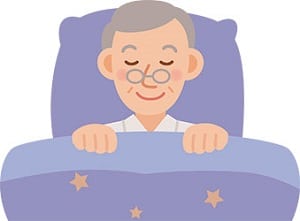 As we age, we all sleep less. In fact, seniors sleep less than any other age group, despite the fact that proper rest is a crucial factor in maintaining good health. Sleep helps prevent both long and short-term illnesses as well as stress-related issues, problems that often plague the senior community. Therefore, as a caregiver, it’s important to keep an eye on the sleep patterns of your senior patients. Read on for the specific signs of sleep affecting a senior’s health and how you can help your patients address the issue.
As we age, we all sleep less. In fact, seniors sleep less than any other age group, despite the fact that proper rest is a crucial factor in maintaining good health. Sleep helps prevent both long and short-term illnesses as well as stress-related issues, problems that often plague the senior community. Therefore, as a caregiver, it’s important to keep an eye on the sleep patterns of your senior patients. Read on for the specific signs of sleep affecting a senior’s health and how you can help your patients address the issue.
- Worsening memory
While some memory loss is expected with age, it can also be exacerbated by lifestyle choices. If you notice your patient’s memory beginning to slip on small things, a lack of sleep may be to blame. Sleep improves the brain’s ability to recall things by consolidating memories and processing them for long-term storage. If you notice your senior patient having unusual difficulty learning new skills, remembering information, or concentrating for long periods of time, you may want to consider helping them readjust their sleep patterns for improved memory storage.
- Anxiety
Keep an eye out for signs of anxiety in a senior, including irritability, fatigue, restlessness and avoidance. These are often signs of inadequate rest. Too little sleep can cause the body to go into survival mode, releasing high amounts of stress hormones and causing anxiety. This can trigger insomnia, rapid heart rate, fatigue and irritability in seniors, often aggravating common age-related discomforts. Ensuring your patient is getting proper rest should return their hormone levels to a normal state and alleviate any additional anxiety they may feel.
- Poor heart health
If your patient is experiencing unusual, or unexplained cardiovascular issues, they might not be getting enough sleep. The added stress that accompanies a lack of rest can put a lot of pressure on senior hearts. Forced to pump more blood faster, they can easily get overworked. This often leads to high blood pressure, inflammation and heart disease, a condition which affects nearly 68 percent of adults between the ages of 60-79. If you notice any spikes in heart-related issues in your patient, consider asking about their sleep quality. Proper rest can help regulate their cardiovascular system and allow their heart to recover after strenuous days. If this doesn’t alleviate the issue, consider a medical visit.
- Weight problems
Sleep regulates hormone levels, including those responsible for appetite and hunger, so consistently missing a few hours can prevent the body from keeping its hormones in healthy proportions. If you notice your senior patient’s weight fluctuating without a disease-related explanation, they likely aren’t getting enough rest. The hormone imbalance that poor sleep can cause often leads to unhealthy nutritional choices and, ultimately, weight gain, especially in seniors who get less exercise. Keep your patient’s appetite-related hormones in check by encouraging them to drink a glass of water after waking up and get around eight hours of sleep every night.
Tips for better sleep
- Take a melatonin supplement. The hormone melatonin regulates sleep patterns and is responsible for feelings of tiredness. While it occurs naturally in the body, you can give your patient supplemental melatonin in a pill or through snacks like almonds or kiwi for an added boost.
- Stick to a routine. It’s important to help your patient keep their body on a bedtime and wake-up schedule because it will make it much easier for them to fall asleep on time. Be strict about them going to bed at the same time every night and not sleeping in for too long. This will create a maintained internal sleep rhythm that will help them stay on track.
- Unwind. Stress can keep seniors from settling into sleep. Help your patient avoid or unload unnecessary stress and anxiety by practicing calming techniques with them before bed every night. Reading, bathing, stretching, or even praying can all have a relaxing effect and help the brain get better sleep.
- Take a warm bath. Many seniors struggle with arthritis and stiffness which can keep them up at night. Taking a warm bath will not only loosen their joints and relieve some of these aches, but it can also help calm their mind and prepare for a deeper sleep.
- See a doctor. If your patient has persisting sleep issues, consider encouraging them to consult a doctor or sleep specialist. Professionals may be able to diagnose a sleep disorder or give your patient more specialized treatment.
There are so many ways that sleep can benefit the mental and physical well-being of your senior patients. Make sure you’re helping them get plenty of rest so they’ll stay healthy and happy! New LifeStyles can help you take better care of your patients and yourself.